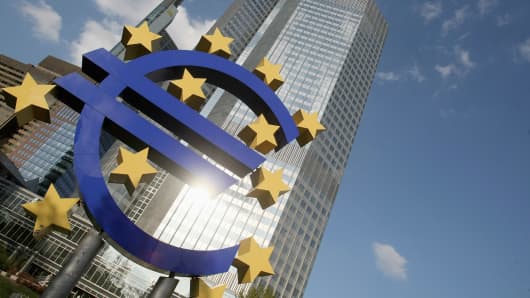Recent comments by European Central Bank (ECB) governing board members have the market brimming with anticipation of an imminent rate cut. But according to one of Angela Merkel's top economic advisers, the ECB shouldn't cut rates.
"If you ask me if the ECB should cut rates, I would say no, because it has a very easy monetary policy with ample liquidity supply and also emergency liquidity assistance," Volker Wieland, a professor at the Goethe University told CNBC.
On Monday, ECB vice president Vitor Constancio said a rate cut "was always a possibility" and that inflation had been falling. Wieland agrees that price pressures are easing and the growth outlook is dim, two factors that could prompt the ECB to act when it meets next on May 2.
Still, there is a chance Mario Draghi will take heed of Wieland's advice. The Stanford educated professor who has also spent several years working for the Federal Reserve in Washington, is an adviser to the ECB,and his clout is even bigger with the German chancellor.
(Read More: 'Sense of Urgency' as ECB Rate Cut Talk Rises)
Wieland is one of the 5 "wise men" German Chancellor Angela Merkel listens to very carefully when it comes to economic policy making.
Since the 1960s this council of economic advisers has been an influential voice in the government's economic agenda.
Wieland's comments come as German growth is noticeably slowing. Purchasing managers index (PMI) data released on Tuesday showed a sharp drop in German business activity in April.
Already, the "wise men" have more than halved their growth outlook for the German economy in 2013, from 0.8 percent to 0.3 percent, mainly because of a "weaker than expected fourth quarter and a lower contribution from net exports in 2013", according to Wieland.
With German elections five months away and no clear majority for Chancellor Merkel's preferred coalition of her Christian Democrats with the Liberals, the chance of a grand coalition with the Social Democrats is looking more and more likely.
(Read More: Europe Higher on Positive France Data)
While investment strategists have recently voiced their concerns about such an outcome and its impact on investing in German stocks, Wieland was sanguine about the potential impact on business investment and spending.
"I think the uncertainty in Germany regarding investment is not coming from the election, it's coming from the whole situation in Europe, what solutions Europe will find, like Italy, a key country, it's not a country you can save by an ESM program, like Portugal, we have a lot of uncertainty, where they go and what kind of government is formed so that's where the uncertainty stems from," he said.
(Read More: Wall Street Announces the Death of Austerity)
"Even though the election is wide open - it could go into a grand coalition, into a SPD/Greens or even SPD/Green/Leftist, we also have a new anti Europe party, which could go into parliament, they're campaigning for exiting the euro zone, so in spite of the open election, I think that's not the major source of uncertainty for investment."
However, Wieland warned the election outcome isn't entirely without risk.
"My personal point of view would be one danger that one stumbles into a situation where a new government would give in to create eurobonds, I think having common debt without any functions of a national state or a European federal state with central powers is a bad idea. That could be destabilizing in the medium term."



